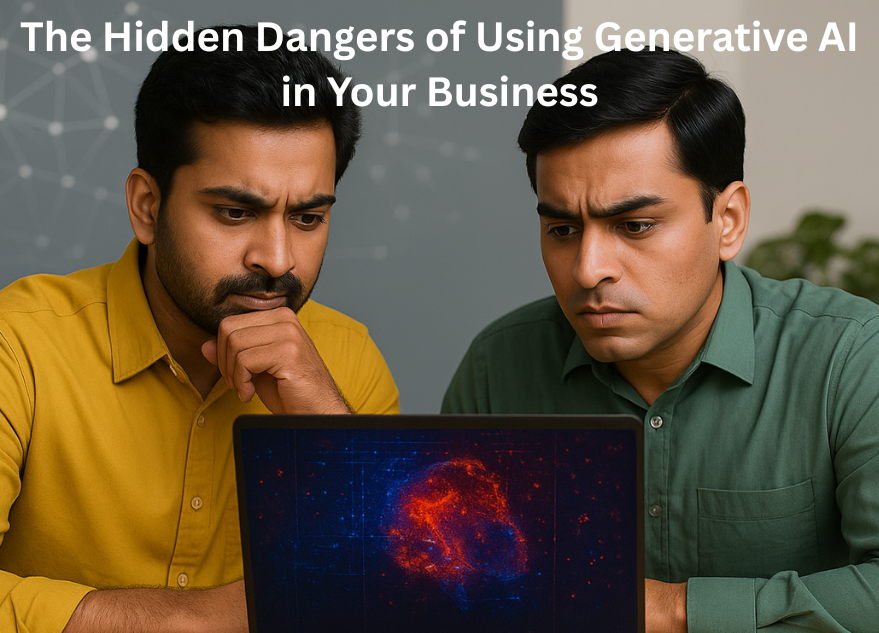Artificial intelligence (AI), especially gen AI, is transforming businesses across the world. While it offers impressive advantages, it also comes with hidden risks that entrepreneurs and small business owners must understand.
💡 Are you looking for Coworking space in Gurgaon, Noida or Delhi? We are just a call away. Call Now: 08999 828282
10 Hidden Risks of Generative AI in Business
- Data Privacy Risks: What You Feed AI Can Be Leaked
- Bias in AI Outputs: The Danger of Hidden Prejudices
- Intellectual Property Issues: Who Owns the AI Output?
- Over-Reliance on AI: Creativity and Critical Thinking Decline
- Security Vulnerabilities: A Backdoor for Cyberattacks
- Regulatory Compliance: Laws Are Still Catching Up
- Misinformation and Content Quality
- Job Displacement: Impact on Employees and Company Culture
- Reputation Risks: Mistakes Can Go Public Fast
- Lack of Transparency: How AI Makes Decisions Is a Mystery
1. Data Privacy Risks: What You Feed AI Can Be Leaked
Generative AI systems learn from the data they are trained on. When businesses use them, they often input sensitive data like customer details, pricing strategies, or internal documents. If not handled securely, this data could be used to train future AI models, creating AI security concerns and privacy violations. To protect your business, ensure you only use secure platforms and limit the sensitive information you input into AI tools.

2. Bias in AI Outputs: The Danger of Hidden Prejudices
One of the most overlooked artificial intelligence threats is bias. Generative AI systems learn from large datasets, many of which contain human biases. These biases can show up in AI-generated content, leading to unfair hiring decisions, marketing errors, or product designs that exclude certain groups. Regularly auditing AI outputs and using diverse datasets can reduce the dangers of artificial intelligence-driven bias.
3. Intellectual Property Issues: Who Owns the AI Output?
A common concern with generative AI in business is ownership. If you use AI to generate product designs, marketing content, or code, do you truly own that material? In many cases, the legal landscape is still unclear. This poses a risk for startups relying heavily on AI-generated work. Consulting legal experts and reading platform terms before using AI tools is essential to avoid costly copyright issues.
Also Read: How AI Is Transforming The Small Business Workplace
4. Over-Reliance on AI: Creativity and Critical Thinking Decline
Many businesses begin depending too much on generative AI for writing, planning, or customer service. This can reduce original thinking and creativity among employees. Human input is still critical, especially for decision-making and innovation. Balancing AI with human expertise can protect your business from one of the lesser-known generative AI risks: stagnation.
5. Security Vulnerabilities: A Backdoor for Cyberattacks
Generative AI tools often connect to cloud services and third-party APIs. If not well-secured, they may become entry points for hackers. Businesses face AI security concerns like data breaches, phishing, or malware insertion through AI tools. Always check the security certifications of AI vendors and conduct regular cybersecurity checks.
6. Regulatory Compliance: Laws Are Still Catching Up
Governments worldwide are creating new AI laws, but the rules are still changing. If your business operates in different countries, you must understand how AI risks vary across regions. Failing to follow future regulations could lead to fines or shutdowns. Stay updated with AI compliance requirements and start documenting how you use AI in your business today.
7. Misinformation and Content Quality
Generative AI can create content at scale, but not all of it is accurate or ethical. If your business publishes AI-generated content without reviewing it, you risk spreading false or misleading information. This is one of the rising dangers of generative AI—it can sound confident even when it’s wrong. Always fact-check AI output and apply human editorial oversight.
8. Job Displacement: Impact on Employees and Company Culture
As AI takes over repetitive tasks, some roles may become obsolete. While this can improve efficiency, it also affects employee morale and loyalty. Transparent communication and upskilling programs can reduce resistance to AI adoption. Managing this transition thoughtfully can help businesses avoid one of the social dangers of artificial intelligence—a disconnected, fearful workforce.
💡 Are you looking for Coworking space in Gurgaon, Noida or Delhi? We are just a call away. Call Now: 08999 828282
9. Reputation Risks: Mistakes Can Go Public Fast
Imagine your AI tool sends the wrong message to a customer or publishes insensitive content. These mistakes can quickly harm your brand reputation. Businesses must have checks and balances when using generative AI in business, especially for customer-facing tasks. Establish review protocols and train staff to identify and correct AI errors before they reach the public.
10. Lack of Transparency: How AI Makes Decisions Is a Mystery
Generative AI often works like a “black box.” You input a command, and it gives an answer—but how it reached that answer is unclear. This lack of transparency can lead to confusion and mistrust, especially in industries like finance, healthcare, or law. To reduce this AI risk, use explainable AI models whenever possible and maintain records of AI-driven decisions.
Incorporating generative AI into your business can unlock efficiency, but it also brings hidden risks—ranging from data privacy breaches to brand reputation damage. It’s crucial to assess tools carefully and implement responsible AI practices. For businesses seeking a secure, productive environment to scale smartly, The Office Pass (TOP) offers trusted coworking spaces with a strong tech backbone and community support.
Get in touch with TOP today at 8999 828282 to find a workspace that empowers innovation—safely.
FREQUENTLY ASKED QUESTIONS (FAQS):
Question: What are the main AI risks for small businesses?
Answer: Small businesses face risks like data leaks, biased content, cyberattacks, and regulatory issues. Without strong security and legal awareness, these threats can lead to financial loss or reputational damage.
Question: How does generative AI create security concerns?
Answer: Generative AI often uses cloud connections and third-party platforms, which can be vulnerable to hackers. If sensitive data is shared with AI, it might be exposed or misused without proper safeguards.
Question: Can AI-generated content be copyrighted?
Answer: In most countries, AI-generated content cannot be copyrighted in the same way human-created content can. This creates legal uncertainty for businesses using AI for marketing, design, or development.
Question: Is AI a threat to jobs in the long term?
Answer: Yes, AI can automate routine jobs, which may lead to job loss in some sectors. However, it also creates new roles in AI supervision, data analysis, and prompt engineering.
Question: Why is AI bias a problem for business decisions?
Answer: AI bias can lead to unfair hiring, marketing discrimination, or customer misrepresentation. Businesses using AI must audit outputs and choose tools trained on diverse datasets.
Question: How do I make sure AI doesn’t spread false information?
Answer: Always fact-check AI content before publishing. Avoid using AI for areas that require expert accuracy like medical advice or legal documents unless reviewed by professionals.
Question: What legal steps should I take before using AI in business?
Answer: Consult a legal expert to understand ownership rights, data protection laws, and platform terms. Keep records of AI usage and customer data interactions for compliance purposes.
Question: Can AI decisions be explained to customers?
Answer: Some AI models allow explanation features, but many do not. Businesses in regulated sectors should prefer explainable AI and document the logic behind decisions where possible.
Question: How do I protect my company’s data when using generative AI?
Answer: Use secure, reputable platforms, avoid inputting sensitive information, and enforce internal policies on AI usage. Regular audits and cybersecurity practices are also crucial.
Question: Should I stop using AI because of the risks?
Answer: No, but you should use it responsibly. Understand the dangers of artificial intelligence, train your team, and combine AI with human oversight to use it safely and effectively



